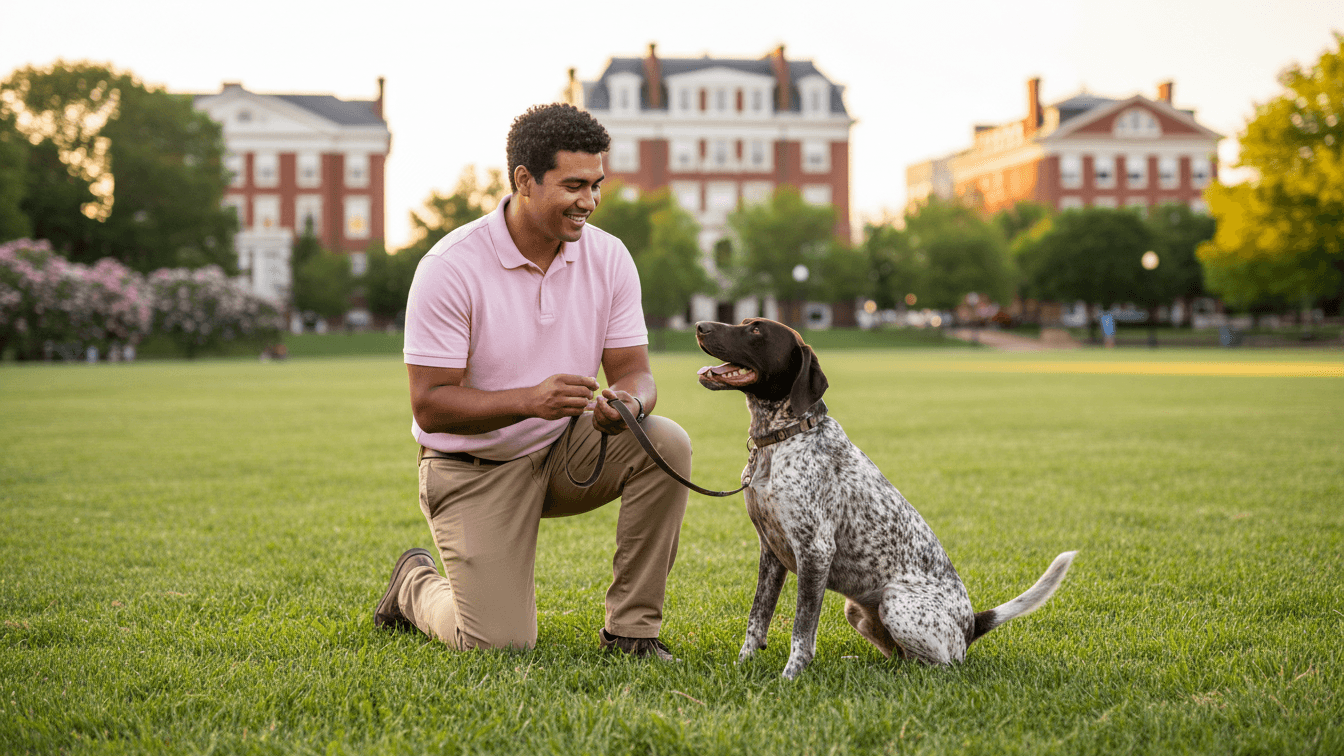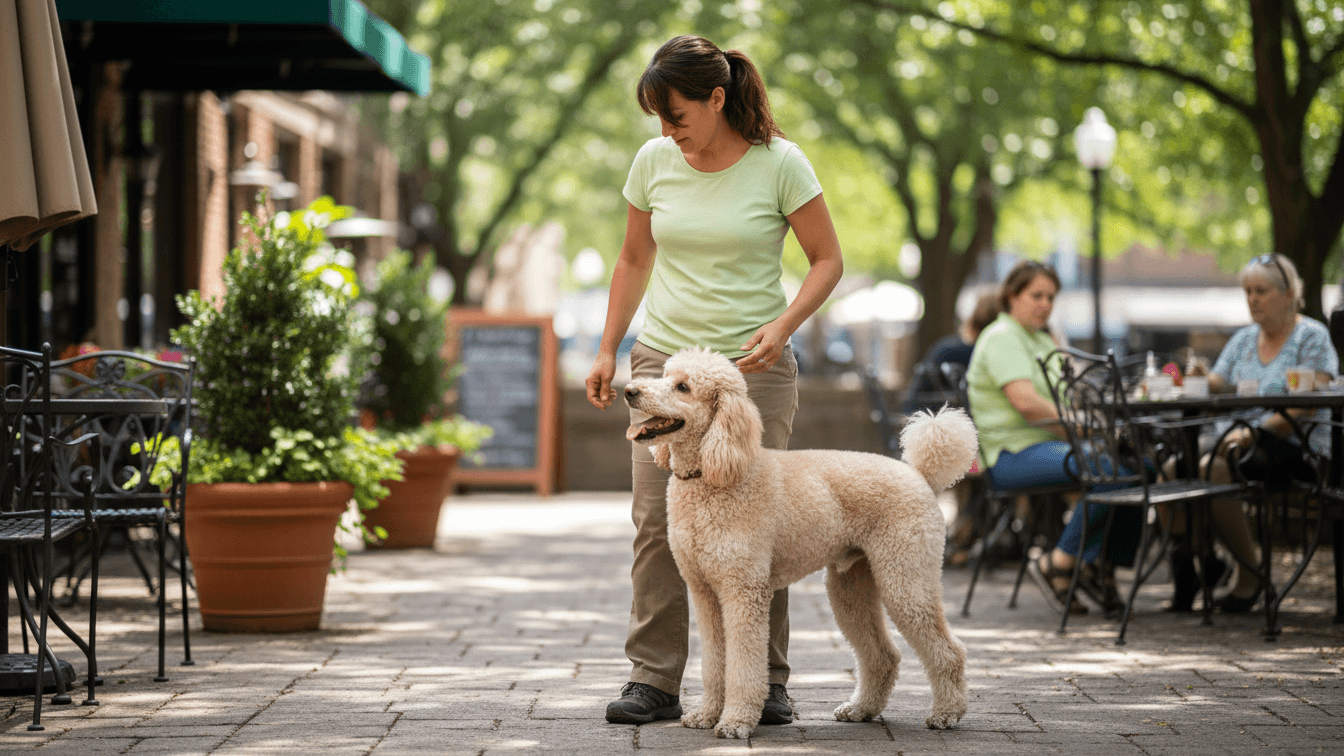Your Complete Guide to Choosing a Dog Trainer in Missouri
Finding the right dog trainer in Missouri means understanding what your dog needs and how those needs fit into the state’s rules, resources, and local dog culture. Whether you’re in St. Louis, Kansas City, Springfield, or a smaller town, Missouri offers plenty of training opportunities, but the quality and approach vary widely.
A good trainer should help your dog navigate everything from busy city streets to state parks, from calm behavior at outdoor cafes to polite greetings at farmers markets. Missouri’s mix of urban centers, suburbs, and rural areas creates unique challenges, so look for someone who understands the specific environment where you’ll be spending time with your dog.
How to Choose the Right Trainer
Start by identifying what you actually need. If your puppy is mouthing, having potty training accidents, and pulling on leash, you need basic puppy training. If your adult dog lunges at other dogs on walks or shows signs of separation anxiety, you need a professional who specializes in behavior modification.
Positive reinforcement training builds trust while teaching your dog what to do instead of just punishing mistakes. This approach works faster, lasts longer, and keeps your dog happy to learn. Look for trainers with recognized credentials like CPDT-KA, KPA-CTP, or CBCC-KA for serious behavior problems.
In-home dog training makes sense when you’re dealing with door manners, jumping on guests, or neighborhood leash reactivity. Group classes work better once your dog can focus around distractions, and they provide valuable socialization practice. Board and train programs can jumpstart progress quickly, but make sure the trainer uses humane methods and includes thorough handoff sessions so you can maintain the training at home.
Private lessons let you customize everything around your dog’s specific challenges and your daily routine. If you work long hours, some trainers offer day training where they work with your dog during the day and teach you how to reinforce the skills in the evening.
Common Dog Training Methods Explained

Reward-based methods are the foundation of modern, science-backed dog training services. These methods teach your dog to make good choices by making those choices rewarding, which creates lasting behavior changes without damaging your relationship.
Basic obedience covers sit, down, stay, place, recall, and leash training. These skills help your dog handle public spaces calmly, whether you’re walking through a busy park in Kansas City or visiting a small-town festival.
Puppy classes focus on socialization, potty training, bite inhibition, crate training, and early manners. The critical socialization window closes around 16 weeks, so starting early prevents future fear and reactivity problems.
Behavior modification addresses issues like fear, reactivity, resource guarding, and separation anxiety through careful desensitization and counterconditioning. For serious aggression or anxiety, look for a certified dog trainer with advanced credentials like IAABC-CDBC or CTC.
Training sessions should always feel productive but never stressful. Your dog should be eager to participate, not shutting down or showing signs of fear. Group classes should give dogs enough space to succeed, screen participants carefully, and focus on teaching calm behavior rather than just excitement and play.
Service dog training and therapy dog training require specialized knowledge, public-access skills, and structured programs that go far beyond basic obedience. Make sure any trainer offering these services can show you their experience and success rate with these advanced training programs.
Skip any trainer who talks about dominance, pack leadership, or being the alpha. These outdated ideas have been thoroughly debunked by modern animal behavior science. Also avoid trainers who rely on prong collars, shock collars, or any tool designed to cause discomfort.
Average Cost of Dog Training in Missouri (Updated for 2025)
Prices across Missouri depend on location, trainer experience, and session length. Urban areas like St. Louis and Kansas City typically run higher than smaller towns, but quality matters more than price.
| Service Type | Average Cost (Missouri) |
|---|---|
| Puppy classes (4-6 weeks) | $140-$260 total |
| Group obedience classes (4-6 weeks) | $150-$280 total |
| Private lessons (60-90 min) | $100-$180 per session |
| In-home training packages (4-6 visits) | $400-$850 total |
| Day training (weekly rate) | $400-$900 per week |
| Behavior consultation (initial) | $135-$225 |
| Board and train (2-4 weeks) | $1,800-$4,200 total |
Expect to pay more for trainers with advanced certifications, extensive experience with aggressive dog training or reactivity cases, or specialized programs. Some trainers offer a free consultation or free evaluation before you commit, which gives you a chance to ask questions and see if their style matches your needs.
Make sure you understand what’s included in the price, how progress gets measured, and what happens if your dog needs extra sessions beyond the package.
Questions to Ask a Potential Dog Trainer
- What training methods do you use, and how do you ensure sessions stay positive and low-stress?
- What credentials do you have, and do you pursue continuing education like CPDT-KSA?
- How will you customize the training plan for my dog’s specific issues and our lifestyle?
- Do you offer in-home sessions, group classes, or day training, and which approach fits my goals?
- How will we measure progress, and when will we add more distractions?
- What are the total costs, including any travel fees or extra sessions?
- Do you carry liability insurance, and can you provide proof?
- For behavior problems, will you coordinate with my veterinarian if needed?
- What should I practice between sessions to help my dog keep improving?
- Can you provide references from clients with similar training goals?
Local Missouri Rules and Considerations
Missouri has statewide rabies vaccination requirements, but local leash laws and licensing rules vary by city and county. Understanding these rules helps you avoid fines and keeps your dog safe in public spaces.
Most cities in Missouri require dogs to be on leash in public areas unless you’re inside a designated off-leash dog park. Leash laws are enforced differently depending on location, with urban areas typically stricter than rural communities.
Missouri state law requires current rabies vaccination for all dogs over four months old. Your veterinarian will provide a rabies certificate and tag that should stay on your dog’s collar. You can find details through the Missouri Department of Health and Senior Services.
Many Missouri cities have nuisance ordinances covering excessive barking, which can lead to fines or complaints from neighbors. If your dog barks at passersby, delivery drivers, or when left alone, work with your trainer on alert barking and separation anxiety before problems escalate.
Dog licensing requirements vary by city. St. Louis and Kansas City both require dog licenses, while many smaller towns don’t. Check with your city clerk or animal control office for local rules.
Missouri doesn’t require dog trainers to hold state licenses or certifications. Anyone can legally call themselves a dog trainer, which makes credentials and references even more important when you’re choosing a professional dog trainer.
If a trainer offers board and train services, their facility may need to register with the Missouri Department of Agriculture as a boarding kennel, depending on the number of dogs they house.
Local Missouri Resources for Dog Owners
Missouri offers excellent spaces for practicing training skills and providing enrichment. These locations give you opportunities to work on polite manners, build focus around distractions, and help your dog become well-behaved in different environments.
- Forest Park in St. Louis includes multiple dog-friendly trails and a large off-leash dog park with separate areas for large and small dogs
- Penn Valley Dog Park in Kansas City offers fenced space for off-leash play and recall practice in a safe environment
- Tilles Park Paw Park in St. Louis County provides separate areas for different dog sizes and plenty of room for training practice
- Katy Trail State Park welcomes leashed dogs on Missouri’s longest rails-to-trails path, perfect for building endurance and focus
- Lakeside Nature Center in Kansas City offers dog-friendly trails where you can work on leash manners around wildlife and families
These spaces work great for practicing recalls, loose-leash walking, and calm behavior around distractions. Always follow posted rules and clean up after your dog.

FAQs
How much does in-home dog training cost?
Most Missouri trainers charge $100-$180 per in-home visit. Package deals typically reduce the per-session cost, and behavior problems often start at the higher end of that range because they require more expertise and customized plans.
Is in-home dog training worth it?
Yes, because you’re addressing problems exactly where they happen. Your trainer can fix door manners, jumping on guests, counter-surfing, and barking at the window right in your home, then step outside to practice leash skills on your actual neighborhood streets.
Can you pay someone to house train your dog?
Absolutely. Many trainers offer puppy training programs that include potty training, crate routines, and management strategies. Day training can speed up the process significantly because your dog gets consistent practice throughout the day, and you learn how to maintain the progress.
What is the 3-3-3 rule for dog training?
This guideline helps set realistic expectations for new or adopted dogs. Expect about three days for your dog to decompress and adjust, three weeks to learn your routines and household rules, and three months to feel completely settled and confident. Good training programs work with this natural adjustment period rather than rushing through it.
How long will it take to reach my training goals?
Most puppies and friendly adult dogs show solid progress within four to eight weeks if you practice daily. Basic obedience skills like sit, down, and loose-leash walking develop fairly quickly with consistent training sessions.
Behavior problems like reactivity, fear, or aggression typically require several months of careful work with gradual increases in difficulty. Your trainer should give you a realistic timeline based on your dog’s specific issues and how much time you can dedicate to practice.
What should I bring to group classes?
Pack a flat collar or harness, a six-foot leash, high-value treats your dog loves, water, poop bags, and current vaccination records if your trainer requests them. Leave retractable leashes at home because they make it hard to control your dog quickly in a group setting.
What’s the leash law in Missouri?
Leash laws in Missouri vary by city and county. Most urban areas require dogs to be leashed and under control in all public spaces except designated dog parks. Rural areas may have more relaxed rules, but it’s always safest to keep your dog on leash unless you’re in a fenced area.
Check your local city ordinances for specific rules about leash length and public spaces.
Do I need a dog license in Missouri?
It depends on your city. St. Louis, Kansas City, and many other larger cities require annual dog licenses. Smaller towns often don’t have licensing requirements. Contact your city hall or animal control office to find out what applies in your area.
Even if your city doesn’t require a license, keeping your dog’s rabies tag on their collar is mandatory statewide.
What shots does my dog need in Missouri?
Missouri state law requires rabies vaccination for all dogs over four months old. Your veterinarian will also likely recommend core vaccines like distemper-parvo and possibly bordetella if your dog will attend dog training classes, visit dog parks, or stay at boarding facilities.
Keep vaccination records handy for group classes and boarding situations.
Are dog trainers required to be licensed in Missouri?
No. Missouri doesn’t require special licenses or certifications for dog trainers. This means anyone can legally offer dog obedience training services regardless of education or experience.
Look for trainers with nationally recognized dog trainer certifications and a commitment to continuing education. Ask about their training methods, experience with your specific issues, and whether they carry liability insurance.
Where can I practice off-leash recall?
Use fenced dog parks to practice off-leash recalls safely and legally. Forest Park and Tilles Park in the St. Louis area, Penn Valley Park in Kansas City, and local parks throughout Missouri offer enclosed spaces where you can work on recalls without risking your dog running into traffic.
Start during quieter times when fewer dogs are present so your dog can focus on you.
Which dog parks allow training around Missouri?
Most public dog parks in Missouri allow training practice as long as you’re not running a commercial training session without permission. Popular spots include Forest Park Dog Park in St. Louis, Penn Valley Dog Park in Kansas City, and Tilles Park Paw Park in St. Louis County.
Always follow posted rules, and consider visiting during off-peak hours when you’re working on new skills.
What trails allow dogs for training?
Katy Trail State Park allows leashed dogs on the entire 240-mile trail, making it perfect for building leash manners and endurance. Castlewood State Park near St. Louis and Lakeside Nature Center in Kansas City welcome leashed dogs on their trails, giving you great opportunities to practice focus around wildlife, other hikers, and families.
Always keep your dog on a six-foot leash on public trails and clean up after them.
What if my dog has separation anxiety?
Separation anxiety requires specialized behavior modification work. Look for a trainer with experience in this area who uses gradual desensitization and counterconditioning rather than flooding or ignoring the problem.
Your trainer may recommend working with your veterinarian for severe cases, as some dogs benefit from anti-anxiety medication alongside a structured training program.
Can I train my dog myself or do I need a professional?
You can absolutely teach basic skills like sit, down, and loose-leash walking on your own if you’re willing to learn proper techniques. But working with expert dog trainers saves time, prevents common mistakes, and ensures you’re building a strong foundation.
For behavior problems like reactivity, aggression, or severe anxiety, hiring a professional makes a huge difference. These issues require careful timing, proper management, and a customized plan that addresses the root cause rather than just suppressing symptoms.
Finding the right training support for your Missouri dog means looking past marketing claims and focusing on credentials, methods, and local knowledge. Whether you’re in a major city or a small town, the right trainer will help your dog become a confident, well-behaved companion who can handle everything Missouri life throws at them.
